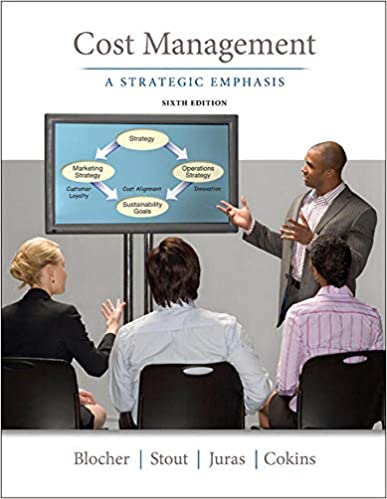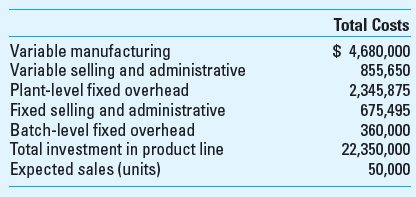
Cost Management 6th Edition by Edward Blocher,David Stout ,Paul Juras,Gary Cokins
Edition 6ISBN: 978-0078025532
Cost Management 6th Edition by Edward Blocher,David Stout ,Paul Juras,Gary Cokins
Edition 6ISBN: 978-0078025532 Exercise 19
Pricing Williams Inc. produces a single product, a part used in the manufacture of automobile transmissions. Known for its quality and performance, the part is sold to luxury auto manufacturers around the world. Because this is a quality product, Williams has some flexibility in pricing the part. The firm calculates the price using a variety of pricing methods and then chooses the final price based on that information and other strategic information. A summary of the key cost information follows. Williams expects to manufacture and sell 50,000 parts in the coming year. While the demand for Williams's part has been growing in the past two years, management is not only aware of the cyclical nature of the automobile industry but also concerned about market share and profits during the industry's current downturn.

Required
1. Determine the price for the part using a markup of 45% of full manufacturing cost.
2. Determine the price for the part using a markup of 25% of full life-cycle cost.
3. Determine the price for the part using a desired gross margin percentage to sales of 40%.
4. Determine the price for the part using a desired life-cycle cost percentage to sales of 25%.
5. Determine the price for the part using a desired before-tax return on investment of 15%.
6. Determine the contribution margin and operating profit for each of the methods in requirements 1 through 5. Which price would you choose, and why

Required
1. Determine the price for the part using a markup of 45% of full manufacturing cost.
2. Determine the price for the part using a markup of 25% of full life-cycle cost.
3. Determine the price for the part using a desired gross margin percentage to sales of 40%.
4. Determine the price for the part using a desired life-cycle cost percentage to sales of 25%.
5. Determine the price for the part using a desired before-tax return on investment of 15%.
6. Determine the contribution margin and operating profit for each of the methods in requirements 1 through 5. Which price would you choose, and why
Explanation
Target Costing:
Target costing is a man...
Cost Management 6th Edition by Edward Blocher,David Stout ,Paul Juras,Gary Cokins
Why don’t you like this exercise?
Other Minimum 8 character and maximum 255 character
Character 255


